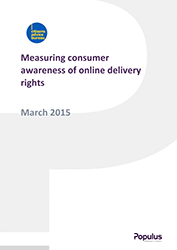Measuring consumer awareness of online delivery rights
 The UK postal market has undergone significant changes in recent years, with a shift in emphasis from a letter-based communications system to a logistics network geared towards parcels, with large increases in parcel volumes.
The UK postal market has undergone significant changes in recent years, with a shift in emphasis from a letter-based communications system to a logistics network geared towards parcels, with large increases in parcel volumes.
Consumers’ dependence on parcels has been fuelled by the growth in online retailing, and the deliveries undertaken to fulfil orders made online. E-retail is now a significant market and Britons spent £103.9 billion shopping online in 2014, with 920 million parcels dispatched by UK e-retailers. Since 2008, the value of online retail in the UK has more than doubled, and is expected to grow by 12 per cent in 2015.
The expansion of online shopping offers new opportunities for consumers – particularly those living in rural, remote and island locations, who arguably have the most to gain from new online shopping opportunities. Yet several recent pieces of consumer research indicate that remote, rural or island consumers are more likely than urban consumers to have experienced a range of delivery issues, both during and after online shopping, including higher delivery costs, longer delivery times and no deliveries.
New distance selling legislation – the Consumer Contracts Regulations 2013 – aims to provide more clarity to UK consumers and parity of online shopping rights when shopping within the UK and across the European Union (EU).
Given the varied experiences of online shopping across different regions of the UK and the presence of this new legislation, Citizens Advice believes it is a good time to judge how well informed consumers are regarding these new online shopping rights. Populus also wanted to pay particular attention to understanding the experiences of online shoppers living in rural, remote and island areas.

